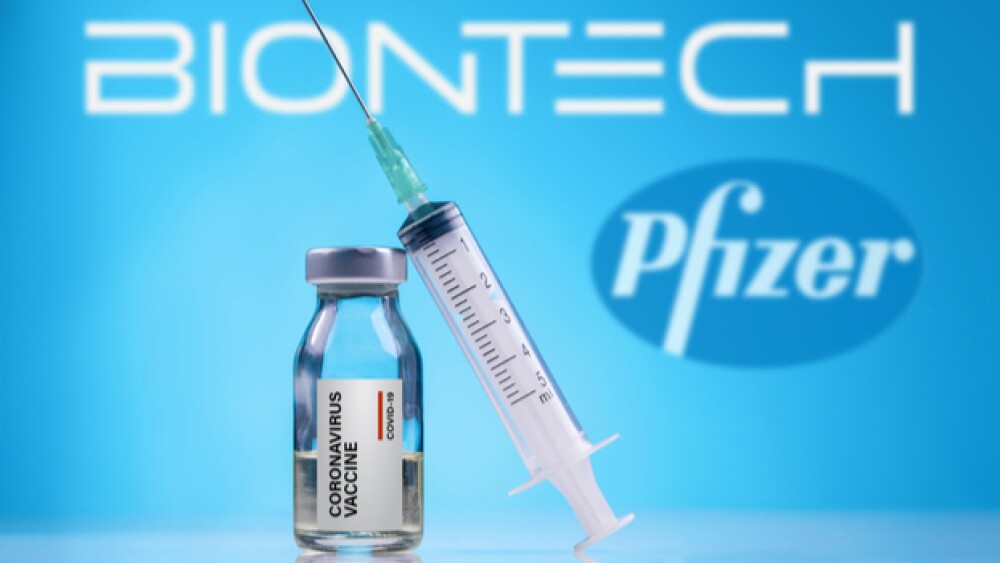Israel’s Health Ministry announced results of a study in the country that showed that the Pfizer-BioNTech COVID-19 vaccine was 98.9% effective at preventing COVID-19 deaths.
Yalcin Sonat/Shutterstock
Israel’s Health Ministry announced results of a study in the country that showed that the Pfizer-BioNTech COVID-19 vaccine was 98.9% effective at preventing COVID-19 deaths. In the study it was 99.2% effective in preventing serious disease, decreased morbidity by 95.8% and decreased the likelihood of hospitalization by 98.9%.
The data was collected throughout Israel through February 13, 2021, from Israelis who had received their second shot of the Pfizer-BioNTech vaccine at least two weeks earlier.
This is the largest real-world study of Pfizer-BioNTech’s vaccine conducted to date, and is made possible by Israel’s aggressive vaccination drive. Prime Minister Benjamin Netanyahu reported on Saturday that he believes 95% of Israelis 50 years and older will be vaccinated in the next two weeks.
Earlier reports from individual health care providers also demonstrated positive results. This has resulted in the Israeli government dropping restrictions on the economy after a lengthy lockdown. As of yesterday, many schools and stores will be allowed to reopen.
The Israel Health Ministry has also implemented a “Green Pass” app that is linked to individuals’ medical records. This allows people who have received both vaccines or are viewed immune after recovering from COVID-19 to stay at hotels or attend cultural or sporting events.
In early January, Israel inked a “vaccines-for-date deal” with Pfizer. Israel promised to share large amounts of medical data with Pfizer in exchange for a steady distribution of the vaccine. The deal allowed Israel to become the first country to vaccinate most of its population, which was the goal. Critics of the arrangement said there are ethical concerns, including potential privacy issues and exacerbating the divide between wealthy countries and poor populations in terms of gaining access to the vaccines. This include Palestinian populations in the Israel-occupied West Bank and Gaza, who have to wait longer to be inoculated.
“Israel will be a global model state,” Netanyahu said at the time. “Israel will share with Pfizer and with the entire world the statistical data that will help develop strategies for defeating the coronavirus.”
Yuli Edelstein, the Israeli Health Minister, told AP in January, that they will turn over the data to “see how it influences, first of all, the level of the disease in Israel, the possibility to open the economy, different aspects of social life, and whether there are any effects of the vaccination.”
In clinical trials, the Pfizer-BioNTech vaccine demonstrated up to 95% efficacy against COVID-19. At this time, how long that protection will last is unknown. It also appears to be “quite effective” against the UK variant as well as the South African and Latin American variants, although probably not as effective against the more contagious South African variant.
In a Saturday statement, Chezy Levy, Director-General of Israel’s Health ministry, said, “The vaccine dramatically reduces serious illness and death and you can see this influence in our morbidity statistics.”
In Israel, as of today’s reporting, 4,250,643 people have received at least one dose and 2,881,825 have received both doses. The country has a population of about 9 million. Approximately 3 million Israelis are not currently eligible for the vaccines, including people younger than 16 years of age and people who have recovered from COVID-19. Israel has been vaccinating almost exclusively with the Pfizer-BioNTech vaccine.
In comparison, according to the U.S. Centers for Disease Control and Prevention (CDC), as of February 21, 2021, 75,204,965 total doses have been distributed in the U.S., with 63,090,634 administered. About 18,865,319 people have received both doses. The U.S. population is approximately 330 million people.
Levy added, “Thanks to Israel’s strong health system that has allowed us to vaccinate an unprecedented wide percentage of the population, and our epidemiological tracking facilities, we are the first country in the world that can show the effect of the vaccine in the real clinical world. Our aim is to continue to vaccinate everybody 16 and older, and when the time comes, those under 16 also, to reach the widest possible coverage of the population that will allow us to return to normal life, which we all long for.”





